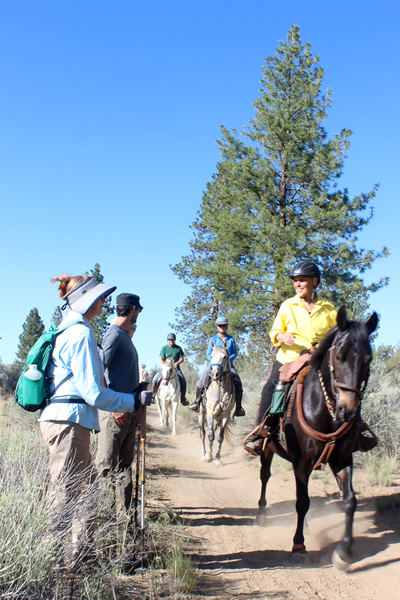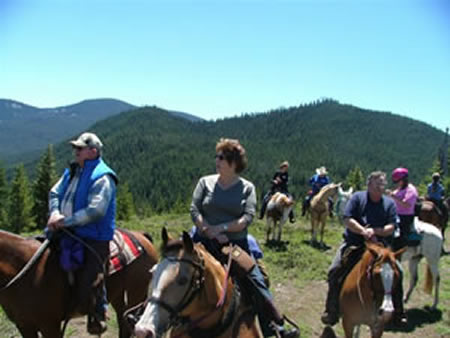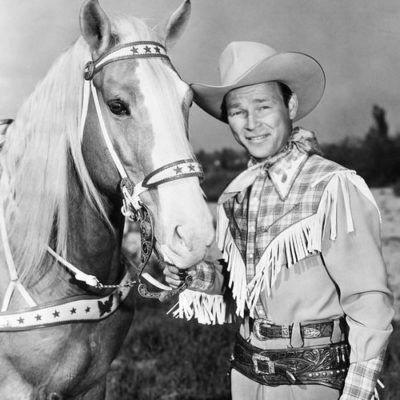As members of OET we are examples of horsemen with good behavior and skills. It is part of our mission to teach other users how to recreate with their horses and not create impact. Avoiding conflict is important. We all have different values. Remember that what bothers you a lot may not bother someone else. Visualize for a minute what it would be like if you were a hiker walking up a trail a foot wide and ran into a steaming large pile of fragrant horse biscuits with flies buzzing around it. You have to break your stride to get around it and you see that monument as disgusting as if it were human waste. That is where many hikers are coming from. We need to be sensitive to that and try to be courteous when hikers are not happy with us. In high use areas stop and kick poop off the trail.
These Leave No Trace (LNT) articles were originally published in the OET Riders Roundup in the early to mid 2000’s. They were written by Bonnie Stockman, a long standing member and supporter of the OET Mission and way. Among her many talents, Bonnie was a Equestrian Leave No Trace (LNT) educator and wrote many articles for the OET Riders Roundup. Today as she watches over us, we honor Bonnie’s work, by reprinting the articles for everyone, so while we ride let’s do our part by leaving no trace and become a better steward of our public lands.
However visitors come to the Backcountry, we need to respect their right to a good wilderness experience.
Many of these guidelines apply to any trail or camp situation whether in a remote wilderness setting or a horse camp at a busy State Park. We’re talking about basic, common courtesy here.

One of the most important thing for riders and other users is to respect private property. Many private areas are open to riding or other public uses, provided the users are respectful of the property and any posted rules. We can keep these riding resources available by our respect of those rules. Leave gates open or shut as you find them. If in doubt about permission to ride, ask the property owner. Especially during dry times of the year, be respectful of closures imposed because of concerns about fires due to dry conditions. Many private property owners are grateful if contacted about any misuse or vandalism of their property.
Many of us who seek out wilderness and Backcountry experiences, like peace and quiet and the sense of being alone in pristine country. This is our time to get away from the hustle and bustle of modern life. While that may be difficult to achieve as more people seek wilderness experiences, if everyone follows these guidelines, it will help preserve everyone’s sense of solitude in the Backcountry:
- Select campsites away from other groups (providing you can select a good LNT site).
- Avoid locating your camp where you are visible from the trail, if you can do so and also choose a good LNT site.
- Make sure the colors of clothing and gear blend in with the environment. The exception to this would be hunting season.
- Leave the electronics home. That’s your tape player, boom box, or radio. Turn off your cell phone except when calling out, or in an emergency.
- Travel and camp quietly. Preferably in small groups. Who wants to meet a mob on the trail?
- Cleanup after your horse at the trailhead. That means put it in the trailer, in a muck bucket or in a manure bin, if there is one. Not everyone is as tolerant of horse manure as horse owners are.
- If your dogs aren’t under total voice control or won’t stay with you (in your sight), leave them at home or back at the trailhead. Respect any posted rules about dogs on the trail or any leash laws. Many other trail users do not appreciate being approached by dogs, friendly or otherwise.
- Just as we expect other non-horse users to be respectful of the special needs of our horses, we should respect the needs of other users. Many non-horse users are not knowledgeable about how to be safe around horses or they may have had a bad experience. We can help them be safe by giving clear and patient directions about where they can best stand to get out of the way without putting themselves at risk. Many non-horse users don’t understand that horses may not perceive them as “human” when they are carrying a backpack or riding a mountain bike. A cheerful hello and a question about trail conditions or weather or whatever, helps start a conversation that clues most horses in that the strange thing they are seeing is yet another kind of “Two-legs” and is probably safe. Sometimes you have to explain to other users that talking is helpful to the horse – some people take the notion of being quiet around horses very seriously! If we set a positive tone and let other users know that we are interested in their experience, we also go a long way towards bridging the gaps with other users.
May we always have Mountains and Rivers Without End.
Bonnie & Velvet









Cat Krolfifer
I am wondering if you are associated with equestrian trails, inc that began in southern calif, many years ago ?
I just found your site and wished i would of known about it when we lived in oregon. Biggest regret is leaving oregon.
Marty DeVall, Administrator
OET (Oregon Only) was started in 1970, maybe!